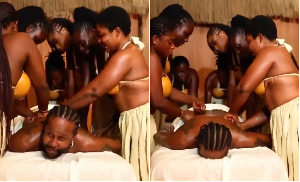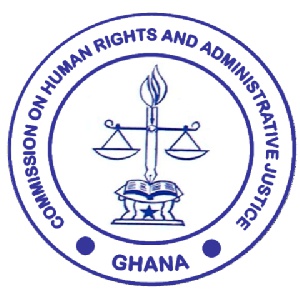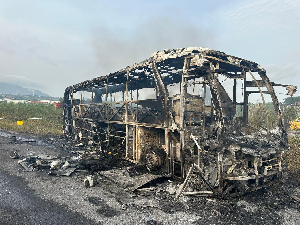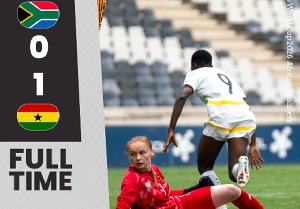Abstract
The Author is a staff of the Commission on Human Rights and Administrative Justice (CHRAJ) and she tries to highlight the Commission’s work through her perspective on, “The contributions of CHRAJ to Social Development in Ghana in the past thirty years of its establishment”.
The paper tries to showcase CHRAJ as of 2023 and highlights some key achievements of the Commission from its inception. It takes its readers down memory lane from the establishment of the Commission and discusses the rationale behind the three mandates of the Commission and the practical implementation of the mandates through its interface with society over its thirty years of existence.
It also offers a brief on the formative years of the Commission and some gist on initial cases handled as an Investigative Body. The paper concludes with some titbits on the way forward.
Introduction
Stocktaking is an essential activity conducted by entities such as individuals, institutions, companies, and enterprises to assess their situation and make firm decisions on the way forward. Such assessment provides an avenue for rejuvenation, alignment and properly catching a glimpse of the state of affairs.
Ghana’s Commission on Human Rights and Administrative Justice referred to as “The Commission” or CHRAJ, was birthed 30 years ago when it found expression in the 1992 constitution under Article 216 which indicated its establishment six months after the coming into force of the 1992 Constitution. Accordingly, the first President of the 4th Republic, Flt. Lt. Jerry John Rawlings duly assented to the CHRAJ Act, 1993 [Act 456] on July 6, 1993, to establish CHRAJ.
On the 6th July 2023, CHRAJ as a creation of the 1992 Constitution, attained thirty years in existence setting standards and best practices in the country and curving a niche for itself globally having worked to sustain a category “A” Status per Global Alliance of National Human Rights Institutions (GANHRI) Accreditation, a status that deems the Commission to be fully compliant with the Paris Principles.
Brief History of CHRAJ
CHRAJ operates from Ghana’s Old Parliament House, an edifice that, hitherto, had hosted Members of Parliament (MPs) from the First, Second, and Third Republics consecutively. The Commission’s maiden Governing Council comprised Justice Emile Short (a private legal practitioner who had practiced in Cape Coast since 1974, after carving out a niche for himself locally by serving on the human rights committee of the Central Region Bar Association), Angelina Mornah Domakyaareh now a Justice of the Court of Appeal, and the late Mr. Benjamin Oppong, a private legal practitioner then.
This council together with a handful of staff absorbed from the Ombudsman office that was abolished and converted to form CHRAJ began the operations of CHRAJ. A few university graduates, lawyers, and retired police officers were also appointed as investigators and support staff to play various roles due to the budgetary allocation and manpower recruitment ceiling by the Management Services Division under the office of the Head of Civil Service.
This was seen as a non-starter by Justice Emile Short if the Commission was to operate efficiently.
This notwithstanding, the Commission members worked hard to build credibility for the Commission in an infant 1992 democratic rule that had just migrated from an authoritarian regime.
This was evident in the Commission’s very first high-profile case in 1996 when some private newspapers made allegations of corruption, illegal acquisition of wealth, and abuse of office against three Public officials in the first term of the Rawlings administration; Presidential Advisor on Cocoa affairs, the Minister of Interior and the Minister of Food and Agriculture.
This was a period when Ghana had just begun its Fourth Republic Democratic Rule and public officers were starting to internalize the tenets of democracy. All three officials were cleared.
This case represented the first time in Ghanaian history that an incumbent government faced investigations, earning CHRAJ a reputation as a truly Independent Body.
Within a year of operation, the Commission created 28 offices in all the 10 regional capitals and submitted its first annual report to Parliament in 1994 in accordance with the provisions of Article 218(g) of the 1992 Constitution and section 7(1) (h) of the CHRAJ Act.
Initial cases to CHRAJ as expected were complaints mainly on human rights abuses from the military rule dispensation such as retrenchments and acts of victimization as well as improper confiscation of assets. This added up to a backlog of cases from the Ombudsman’s office and summed up to 3,197 received cases with 333 cases carried over from the Ombudsman office, (source: chraj 1993 annual report). The 3,197 cases received also included labor-related disputes; wrongful dismissals, end-of-service benefits, and termination of appointments.
In 2004, the Commissioner of CHRAJ, Justice Emile Short was elected by the United Nations General Assembly to be the Ad Litem Judge with the United Nations International Criminal Tribunal for Rwanda in Arusha, Tanzania.
He took an indefinite leave handing the Chair of the CHRAJ Governing Council in an Acting Capacity to Ms. Anna Bossman, also a legal practitioner, a bilingual with a fluent French accent who built on the work of Justice Short to become “The Toast of the Media”.
As of 2023, the Commission has expanded its operational structure from four Departments (Operations, Legal, Administration and Finance) to ten departments (Human Rights, Administrative Justice, Anti-Corruption, Research, Public Education, Investigations, Legal Services, Human Resources, and Administration, Finance and Budget).
There are also eight autonomous Units namely Audit, International Corporation, Programme and Projects, Strategic Management and Innovations, Corporate Affairs and Communications, Policy Planning, Monitoring and Evaluation, Procurement and Logistics.
These Departments and Units have been created to support the expanding better place aspects of its work that were being handled in bits by different Departments and Units under one Department/Unit.
The commission has also increased its visibility in all 16 regions to bring its services, which are free, to the doorstep of all Ghanaians in line with Section 10 of the CHRAJ ACT which makes provision for the creation of CHRAJ offices in all regions and districts capitals in Ghana.
Additionally, two sub-regional offices have been created in Tema and Obuasi due to sprouting industrialization and commercial activities likely to record human rights violations in such areas.
Mandates of CHRAJ
By the Commission’s enabling law, Act 456 pursuant to Article 218 of 1992, CHRAJ is Ghana’s National Human Rights Commission which promotes and protects fundamental human rights and freedoms of all persons in Ghana; the Ombudsman for the Public Service, to check maladministration in Public Service; and an Anti-corruption Agency, to curb corruption in Ghana.
The rationale behind this hybrid system stems from the Paris Principles; an international standard for National Human Rights Institutions, that indicates how National Human Rights Institutions in developing countries be given a broad mandate within their Constitutions, so they use their limited resources to the greatest possible effect.
Again, issues of maladministration and corruption often occur in sync with human rights abuses. CHRAJ, therefore, provides a “one-stop” service across a range of issues. It offers economies of scale, avoids additional infrastructural costs to the country and leverages synergies with far-fetching benefits to the country in working more cooperatively on complaints that straddle around the three mandates.
These withstanding, inadequate funding by the government has arguably been a limitation to the realization of such broad mandates. Donor Partners such as the Hans Seidel Foundation, Konrad Adenauer Foundation, the British Council, the German embassy, the Netherlands embassy, the UNDP, Star Ghana, ARAP, EU, Crossroads International, The Danish Institute for Human Rights, Amnesty International, OXFAM and others have supported CHRAJ through various cooperations.
Functions of the Commission
CHRAJ is primarily an Investigative Body which investigates in line with its mandates:
1. Complaints of violations of fundamental human rights and freedoms from practices and actions of persons, private enterprises, and institutions that violate fundamental human rights and freedoms as outlined in chapter five (5) of the 1992 Constitution of Ghana.
2. Complaints of Administrative injustice (maladministration) and unfair treatment of any person by a public officer in the exercise of their official duties under articles 23 and 296 of the 1992 Constitution of Ghana and concerning the functioning of the Public Services Commission, the Administrative Organs of the State, the offices of the Regional Coordinating Council and the District Assembly, the Armed Forces, the Police Service and the Prison Service in so far as the complaints relate to the failure to achieve a balanced structuring of those services or fair administration in relation to those services;
3. Complaints of Corruption, abuse of power, and contravention of the Code of Conduct of Public Officers under Chapter 24 of the 1992 Constitution. The Commission handles the above cases by taking appropriate action to call for their remedying, correction, and reversal through such means as are fair, proper, and effective, including:
(i) negotiations and compromise between the parties concerned and;
(ii) causing the complaint and its finding it to be reported to the superior of an offending person;
(iii) bringing proceedings in a competent Court for a remedy to secure the termination of the offending action or conduct or the abandonment or alteration of the offending procedures; and
(iv) bringing proceedings to restrain regulation by challenging its validity if the offending action or conduct is sought to be justified by subordinating legislation or regulation that is unreasonable or otherwise ultra vires.
4. The Commission also educates the public as to their human rights and freedoms by such means as the Commissioner may decide, including publications, lectures, and symposia.
5. The Commission works to support the Government in ensuring monitoring, implementation; and addressing at the national level, core human rights concerns such as torture, arbitrariness, and victimization; contributing to eradicating all forms of discrimination.
6. It also takes on new roles as new legislations are adopted. For example:
The Juvenile Justice Act 2003 (Act 653); Section 42(2) provides that: “The Commission on Human Rights and Administrative Justice may visit and inspect any centre.”
The Human Trafficking Act, 2005 (Act 694); Section 6 of Act 694 provides as follows: “A person with information about trafficking (a) shall inform the police, or (b) The Commission on Human Rights and Administrative Justice’’.
III. Office of the Administrator of Stool Lands Act, 1994 (Act 481) Section 8(2) provides as follows: “A beneficiary of stool land revenue aggrieved by the apportionment of the stool land revenue, may submit a complaint to the Commission on Human Rights and Administrative Justice.”
IV. Children’s Act, 1998 (Act 560); Section 48(2) provides that: “The following including (d) The Commission on Human Rights and Administrative Justice’’, may apply to a family tribunal for a maintenance order:
V. Whistleblower Act, 2006 (Act 720); Section 3(1h) confers an additional mandate on the Commission to investigate disclosures of impropriety (economic crime, waste, mismanagement, misappropriation of public resources, environmental degradation) and complaints of victimization of whistleblowers.
Such additional responsibilities imposed on the Commission by emerging legislations indicate the overwhelming tasks of the Commission through the performance of those tasks.
PRACTICAL IMPLEMENTATION OF CHRAJ MANDATES
The crux of CHRAJ’s mandate is to promote and protect fundamental human rights and freedoms in Ghana as outlined in chapter five (5) of the 1992 Constitution of Ghana, drawing on various United Nations (UN) Covenants and Conventions. The essence of this duty to CHRAJ is to bridge claims of rights by right holders and the realization of rights by duty bearers. This linkage provides bedrock to social change in the country.
As indicated by the United Nations Committee on Economic, Social and Cultural Rights, General Comment Number three (3), every state after ratifying a convention or covenant, must meet a minimum core obligation of ensuring the satisfaction of, at the very least, minimum essential levels of rights therein the covenant or convention so as not to be in violation of such Covenant or Convention.
This is in line with the UN agenda to enhance social development globally and a duty to CHRAJ to ensure the State obliges with its responsibilities after the ratification of such treaties.
Midgley (1995, 250) defines this social development as "a process of planned social change designed to promote the welfare of citizens as a whole in conjunction with a dynamic process of economic development as operationalized by Ghana’s National Development Planning agenda in the areas of Education, Health, Food Security, Population Management, reducing inequality and human security.
Interface with Society
Every year, the Commission through its flagship programme, “State of Human Rights (SOHR)” in Ghana, highlights human rights issues of great concern to citizens in the year under review. It monitors initiatives taken by appropriate duty-bearers to address such concerns and then creates a forum to engage with stakeholders to set further agendas for the government.
Issues of interest have been the FCUBE, feeding grant of inmates/detainees, trokosi, widowhood rites, corporal punishment, bullying in schools, the National Health Insurance Scheme (NHIS), condition of remand prisoners and refugees and their right to education, female genital mutilation, witchcraft allegations and trial by ordeal etc…
Public Education
The Commission, in conducting its public education function under Article 218(f) of the 1992 Constitution and Section 7(g) of the CHRAJ Act, 1993(Act 456), has through various collaborations and sponsorships, organized numerous Community Outreaches, Media campaigns and published reader-friendly materials for the public.
These programmes are geared towards sensitization of society on their rights and responsibilities under the law and empowering them to hold power accountable at all levels of governance. Beneficiaries of such programmes have been the Security Services, Metropolitan, Municipal, and District Assemblies (MMDAs), Public Institutions and Corporations, Schools, Communities, Religious Bodies, and the general public who are mostly reached through Mass Media (both electronic and print), and the Local Community Information Centres.
Youth Development
The Commission prioritizes the youth as agents of social transformation in the promotion of human rights to build a new generation imbued with integrity and respect for the dignity and worth of all persons.
It has established several human rights and integrity clubs in basic and senior high schools as platforms to learn about human rights and develop the culture of human rights to respect the dignity and worth of the individual, eschew corrupt acts, and promote non-discrimination.
It periodically engages with school children through various child developmental programmes organized in the form of debates, quizzes, writing competitions, and its novelty annual human rights and integrity camps for Senior High Schools across the country. It is worth mentioning DANIDA, The Danish Institute for Human Rights, and Amnesty International‘s support in this work of the Commission.
Minority Groups
The Commission has in diverse endeavors enhanced the inclusion of Persons with Disabilities (PWDs), People Living with HIV and AIDS, and LGBTIs in society.
In 2018, the Commission developed braille and audio tapes on the CHRAJ Act and its three mandates for distribution to the visually impaired. This was to sensitize them about the Commission so they could relate to it.
Sign language interpreters were also invited to programmes organized by the Commission to ensure the active participation of persons with hearing impairment. Online Discrimination Reporting System (DRS) and SMS module have been developed where Persons with Albinism, People Living with HIV and AIDS, and LGBTIs can lodge complaints to specially designated staff of the Commission under strict privacy and confidentiality.
Human Rights of Detainees
The human dignity of prisoners has been of paramount interest to the Commission from its inception. Annually, the Commission conducts a nationwide inspection of prisons and holding centres to observe the situation of persons in detention as it ensures that they are held in accordance with international standards.
This inspection has brought to light issues such as overcrowding, low feeding grant per inmate, the inability of the Courts to handle cases expeditiously, committal of teenagers into adult prisons instead of correctional centers, indefinite holding of condemned prisoners in mentally tortuous states, and the non-consideration of time spent in remand when passing final sentence, issues on missing dockets among others which have received due attention from the Attorney - General and Ministry of Justice, the Ghana Prisons Service, the Ghana Police Service and the Judiciary.
In line with the United Nations Optional Protocol on the Convention Against Torture, The Commission is expecting to receive full complement as the National Preventive Mechanism (NPM) for Ghana following the successful review of the CHRAJ Act to enable it to play its key role in preventing torture and complementing the work of international bodies on torture in the country.
As an NPM, CHRAJ becomes the national component of the preventive system established by the OPCAT and can have direct contact with the UN Subcommittee on the Prevention of Torture. The Commission is then mandated to conduct regular monitoring visits to all types of places where persons are detained to ensure its alignment with the Nelson Mandela rules and also identify early warning signs, access all information, and be able to talk with detained persons in private.
NGOs and CSOs Engagements
The Commission continues to work closely with Human Rights NGOs in the country as recommended by the Paris Principles to advance human rights at the grassroots in the areas of education, health, shelter, community participation in governance, gender issues, etc… This comes in the form of collaboration at the district, regional and head office levels to collectively conduct programmes that target social development.
The Commission has also created an NGO forum to engage with NGOs and create a platform for peer experience sharing to enhance their capacities in the various thematic areas of their operations. The Commission is also home to varied Civil Society Organizations (CSOs) in the country.
Development of NACAP
The Commission played a key facilitation role in developing the National Anti-Corruption Action Plan (NACAP) for Ghana and continues to facilitate its implementation by the Office of the President to limit opportunities for corruption in Ghana and make engagement in corrupt acts a high-risk and low-gain venture by individuals. The operations of NACAP have triggered the passage of the following pieces of legislation to include;
1. Security and Intelligence Agencies Act, 2020 (Act 1030),
2. The Real Estate Agency Act, 2020 (Act 1047),
3. The Criminal Offences (Amendment)Act,2020 (Act 1034),
4. The Anti-Money Laundering Act, 2020 (Act 1044),
5. The Narcotics Commission Act, 2020 (Act 1019),
6. Companies Act, 2019 (Act 992),
7. The Right to Information Act ,2019 (Act 989),
8. Payment Systems and Services Act, 2019 (Act 987),
9. Witness Protection Act, 2018(Act 975),
10. Public Financial Management Act, 2016(Act 921), and
11. The Public Procurement (Amendment), Act 2016 (Act 914) etc.
Case Handling at CHRAJ
The operations of the Commission have empowered the citizenry; various individuals and groups to demand accountability and this is evident through the array of cases CHRAJ has resolved over its thirty years in existence.

The Commission receives complaints from individuals and groups including minors who can lodge a complaint through a next friend (A person 18 years and above). Persons in custody or patients in a hospital can also under Section 12 (4) of the CHRAJ Act, lodge complaints with CHRAJ.
Complaints by a person in custody or a patient in hospital, are addressed to the Commissioner and immediately forwarded, unopened, and unaltered to the Commissioner by the person in charge of the place or institution where the writer is detained or of health facility in which he or she is a patient.
Generally, complaints can be made through a walk-in, through post, email, online, and text message. These are resolved through panel hearings, mediation, negotiation, and case referrals.
The Commission also goes to court on behalf of clients to seek available remedies for its decisions that are not complied with under section 9 of CHRAJ Act, ACT456, “go to any court in the republic and seek any remedy available in the court for the performance of its functions”.
The Commission’s case-handling procedure is evidence-based therefore it uses its inquisitorial powers to require any institution or person to produce information, documents, records, or other materials that will assist in investigations.
Complaints of Stigma and Discrimination are reported through a Stigma and Discrimination online system (sdrs.chraj.gov.gh) to ensure the confidentiality of the complainant and other parties. USSD CODE *920*56# can also be used. The toll-free line is 0800330330.
All complainants must file their complaints as soon as the incident occurs. In delay, the complainant must prove that he/she delayed in complaining due to either slow progress in trying to exhaust all internal redress mechanisms or that the complaint has been decided on by an earlier authority but still not satisfied with the outcome.
Milestones
Internationally, the Commission is the Current Chair of the Network of African National Human Rights Institutions (NANHRI), Chair of the Working Group on SDGs and Agenda 2063 that includes Kenya, Cameroun, South Africa, Malawi, DRC, Algeria, and Sierra Leone, for a third two-year term and one of the NANHRI elected together with Morocco, DRC, Zimbabwe to represent the African region in the GANHRI Bureau for a two–year term.
This bureau is made up of 16 members who manage GANHRI. CHRAJ, again, is serving on the GANHRI sub-committee for accreditation of NHRIs globally in accordance with the Paris Principles as an alternate member to the South African Human Rights Commission. This feat has opened the Commission up for experience-sharing visits by other NHRIs periodically.
Nationally, the following are some milestones of the Commission;
1. Resolution of sexual harassment case involving a flight attendant and CEO of an airliner that attracted publicity in the country and parts of West Africa that sent a strong message to intending perpetrators.
2. Advocacy roles that led to curtailing of harmful cultural practices on widowhood rites and criminalization of Trokosi and Female Genital Mutilation in Ghana.
3. Re-instatement of 3 Fire Service lady Fire Fighters to enjoy their right to marry and found family.
4. Case of Midwifery Council vrs male applicant that paved the way for midwifery training schools to admit qualified male applicants.
5. Development of a Code of Conduct for Public Officers in Ghana with the collaboration of other key stakeholders.
6. Investigation of President John Mahama in the Ford Case and President John Agyekum Kufuor in the “Hotel Wawa” Case.
7. Investigation of Richard Anane in Abuse of Office Case
TITBITS ON THE WAY FORWARD
The Commission requires logistical and fiscal support to strive. The section of the head office of CHRAJ, which was gutted by fire and is being rebuilt is calling for attention. The Regional and District offices integrated into the fold of MMDAs and provide a platform for community members to engage with the government directly through programmes organized and policies that emanate from the outcome of complaints lodged with the Commission are operating with minimal resources.
The Commission’s forthcoming fourth mandate as Ghana’s National Preventive Mechanism would require the injection of more resources for its effective implementation.
The government is urged to take a paradigm shift in the financing of the operations of the Commission to efficiently promote the pivotal role of the Commission in promoting and protecting fundamental human rights and freedoms, to further social development in Ghana.
REFERENCE
1. Chraj publication; A presentation by Commissioner Joseph Whittal, International Anti-Corruption Day, 9 December 2022, LA Palm, Accra, https://chraj.gov.gh/wp-content/uploads/2022/12/... · PDF file
2. Chraj publication; A presentation on Staff Capacity by Henry Ashley, Visit by Working Group from Ethiopian Human Rights Commission, (2022)
3. Children’s Act, 1998 (Act 560); Section 48(2)
4. Midgley J (1995). Social Development: The Developmental perspective of Social Welfare, London: SAGE Publications Limited.
5. The Juvenile Justice Act 2003 (Act 653); Section 42(2)
6. The Human Trafficking Act, 2005 (Act 694); Section 6
7. Office of the Administrator of Stool Lands Act, 1994 (Act 481) Section 8(2)
8. United Nations New York and Geneva (2010), National Human Rights Institutions History, Principles, Roles and Responsibilities.
9. Whistleblower Act, 2006 (Act 720); Section 3(1h)
10. https://chraj.gov.gh/Chraj Annual Reports, 1993– 2020,
11. https://www1.essex.ac.uk/hrc/documents/practice/joseph-whittal-dispute-resolution-mechanism-in-the-chraj-in-ghana-presentation.pdf
Opinions of Friday, 24 November 2023
Columnist: Christiana Quashigah
Stocktaking: CHRAJ@30
Entertainment














